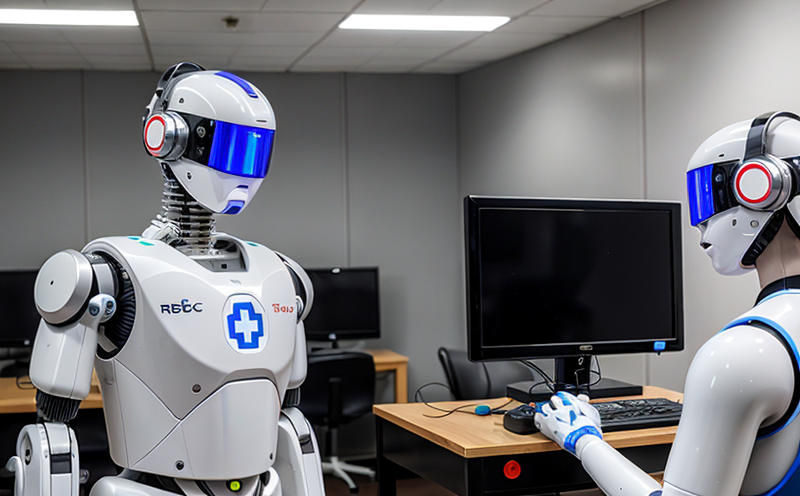ISO 80601-2-80 Patient Transfer Robot Safety Testing
The ISO 80601 series is internationally recognized as a benchmark for medical device safety. Specifically, ISO 80601-2-80:2007 pertains to the mechanical stability and load-bearing capacity of medical devices used in patient transfer systems.
Patient transfer robots are critical components in healthcare settings where mobility assistance is required for patients with physical disabilities, elderly individuals, or those undergoing rehabilitation. These robots must be meticulously designed, manufactured, and tested to ensure they meet stringent safety standards. This service focuses on the comprehensive testing of such robotic devices using ISO 80601-2-80.
The primary goal is to identify potential risks associated with mechanical failures that could lead to harm. The test parameters encompass static and dynamic load-bearing capacities, structural stability under various conditions, and operational safety checks. Compliance with these standards helps manufacturers achieve regulatory approval and enhances the trustworthiness of their products among healthcare providers.
Our testing facilities are equipped with state-of-the-art machinery capable of simulating real-world scenarios that patient transfer robots encounter in hospitals and clinics. This includes but is not limited to, various weights representing different patient sizes and conditions, diverse terrains (smooth surfaces vs. rough ground), and multiple operating modes.
Our team comprises highly qualified engineers who possess deep expertise in robotics, biomechanics, and medical device regulations. They ensure that every aspect of the testing process adheres strictly to ISO 80601-2-80 guidelines. The comprehensive nature of our service guarantees not only compliance with international standards but also the identification of any hidden flaws or areas for improvement.
Upon completion, detailed reports are generated highlighting all findings and recommendations for necessary adjustments. These reports serve as valuable tools both during product development stages and post-market surveillance activities. They provide manufacturers with actionable insights that can contribute significantly towards enhancing the overall safety profile of their products.
In summary, our ISO 80601-2-80 Patient Transfer Robot Safety Testing service offers a robust framework for ensuring compliance with global standards while providing comprehensive testing capabilities tailored specifically to this sector. By leveraging advanced technology and experienced professionals, we deliver reliable results that uphold the highest levels of patient care.
Industry Applications
The application of ISO 80601-2-80 standards extends beyond just ensuring mechanical integrity; it plays a crucial role in safeguarding patients and healthcare workers alike. In hospital environments, where multiple users interact with these devices regularly, reliability is paramount.
For instance, robotic systems designed to assist bedridden patients transitioning between their beds and wheelchairs must maintain stability even during sudden movements or unexpected loads. Our testing ensures that these robots can withstand such stress without compromising on safety features like emergency stop mechanisms or fail-safe brakes.
In rehabilitation centers, where therapy sessions often involve repetitive transfers over extended periods, continuous reliability is essential. Testing according to ISO 80601-2-80 helps guarantee that the equipment remains effective throughout its lifecycle, minimizing downtime and ensuring consistent quality of care.
Moreover, compliance with these standards enhances brand reputation by demonstrating commitment to patient safety. Hospitals and clinics increasingly prefer partners who meet or exceed international regulations, making our service an attractive proposition for manufacturers seeking broader market access.
Customer Impact and Satisfaction
Our clients benefit greatly from the ISO 80601-2-80 Patient Transfer Robot Safety Testing service in several ways:
- Enhanced Compliance: By adhering to these stringent standards, manufacturers ensure their products meet regulatory requirements and avoid costly rejections or recalls.
- Patient Safety: Rigorous testing reduces the risk of accidents involving patients using transfer robots. This builds trust between healthcare providers and the public.
- Innovation Support: Our detailed reports offer valuable feedback for improving existing models and developing new features, fostering continuous innovation within the industry.
- Maintained Quality: Consistent performance across all units produced ensures uniform quality standards, which is crucial for maintaining high patient satisfaction levels.
A satisfied customer base translates into increased market share and stronger brand loyalty. Our clients appreciate our commitment to excellence, reflected in our comprehensive service offerings that go beyond mere compliance checks.
Environmental and Sustainability Contributions
The emphasis on robust construction and efficient operation within ISO 80601-2-80 standards indirectly contributes positively towards environmental sustainability. Products that meet these stringent requirements tend to be more durable, reducing waste generation associated with frequent replacements due to mechanical failures.
Additionally, by promoting safer transfers, which can reduce the likelihood of injury or rehospitalization, our testing service supports better resource utilization within healthcare systems. This aligns well with broader sustainability goals aimed at improving efficiency and effectiveness in medical care delivery.
Manufacturers who adopt sustainable practices also contribute positively to their communities' overall well-being. They set benchmarks for responsible manufacturing processes that extend beyond mere compliance with legal frameworks into proactive environmental stewardship.





